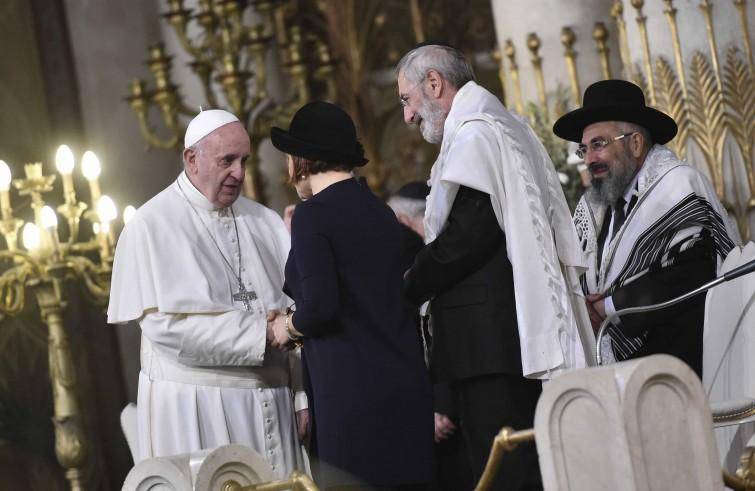Shalom Aleichem: Francis’ Message at Rome’s Synagogue
The event coincided with a “Day of dialogue between Catholics and Jews.” At a time when tensions are running high, the eloquent and visionary icon told the Jewish and Christian communities that they have an important contribution to make in the campaign for peace.
Today’s world is plagued with crises; anti-Semitism has resurfaced and intensified, and many Jewish communities have paid dearly for it. There is an ideology of fear threatening to destroy the positive progress that has been made through dialogue, engagement and a reciprocal easing of tensions between people. Embracing and shaking hands, Pope Francis and Rome’s chief rabbi Riccardo Di Segni have renewed their firm vow to continue the dialogue between the faiths without which men are only capable of doing violence to one another.
It’s a task that awaits every person of good faith confronted by a complex world, an indispensible need for good news in a time of diminished hope. For religions, dialogue is a spiritual reality, a deep and thoughtful conversion that harkens to the path of God and initiates a dialogue with He who is greater than us. Nevertheless, that dialogue has been interrupted by the shortsightedness of global capitalism—a shaky road to nowhere—in spite of the fact that everyone can see that a world in which we do not talk to one another can only bring about aggression.
Aggression breeds contempt. Contempt once again gives rise to those walls of hatred thrown down a few decades ago. But what destiny can lead humanity to choose hate as its guiding light, where “Christians and Jews are confined to defending themselves from merciless, violent and intolerant enemies, who in the name of God incite terror?” Salvation for all—Christians, Jews and Muslims alike—can only be arrived at through dialogue. Living together means more than physical proximity.
It is not enough to know where our neighbors come from or to what religion or group they belong. Living together entails sharing the ups and downs of human experience: welcoming and being welcomed in return, laughing and crying together.
Without a vital togetherness there can be no integration, no dialogue between cultures or religions. John Lennon’s “Imagine” calls for a world without religions, without heaven or hell, to overcome conflicts generated by difference. Religions occupy an increasingly relevant space in the geopolitical spectrum, in the Mediterranean and around the world: many crises stem from what seems to be a clash of different religious sensibilities, from different forms of belief.
The problem will not be solved by denying our differences, assimilating others into a culture considered to be superior, or worse, by organizing crusades that wipe out “the Other” or force them to convert to one side. Because conflicts do not stem from religious belief but from diabolical economics: the saints of every faith have always favored peace and open dialogue.
Destroying such dialogue between cultures and faiths means building a wall that divides communities, cuts off communication, and drives everyone to adopt a stance of self-sufficient isolationism that is as tragic as it is aggressive. To reengage in dialogue is decisive for the future of humanity, even more so when violence is met with terror, Kalashnikovs with purges or the seal of disgrace. In order to build dialogue, we must be so daring and visionary as to imagine a common house of prayer for all faiths, a temple that bridges our differences to overcome the fear that divides us. We must counter those hatefully decapitated heads with a powerful symbol of brotherhood so that we can surmount the obscene and widespread conviction that diversity is impure. At Rome’s Tempio Maggiore, Jews and Christians took another step toward fully accepting each other, an important step on a long road yet, pronouncing “every man is and forever will be my brother.”
* Gennaro Matino: teaches Theology and History of Christianity in Naples, where he runs the parish of SS. Trinità. He has written several books and collaborates extensively with both traditional and new media.





































i-Italy
Facebook
Google+
This work may not be reproduced, in whole or in part, without prior written permission.
Questo lavoro non può essere riprodotto, in tutto o in parte, senza permesso scritto.